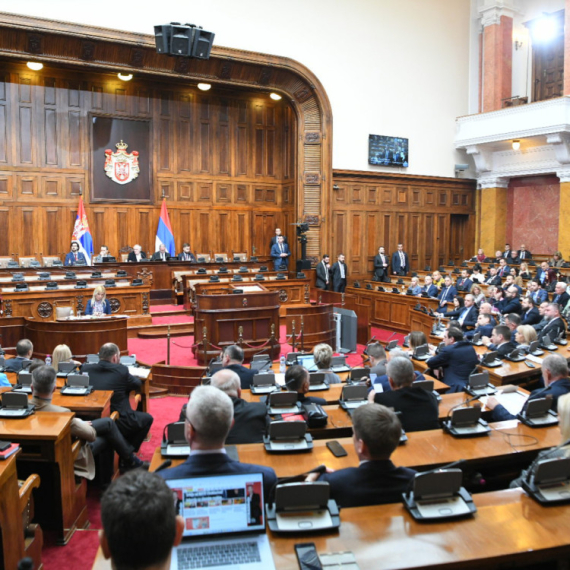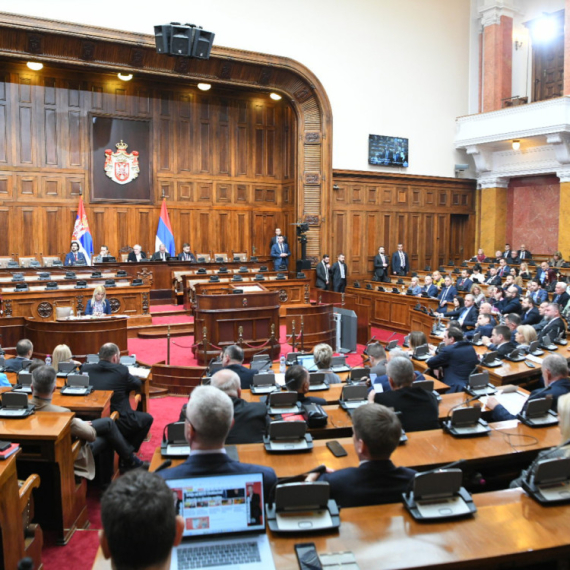EU criticizes downgrade in eurozone countries
European reactions to Standard & Poor's credit downgrade of nine eurozone members on ranged from "surprised" to "incomprehensible".
Saturday, 14.01.2012.
13:29

European reactions to Standard & Poor's credit downgrade of nine eurozone members on ranged from "surprised" to "incomprehensible". EU Economic and Financial Affairs Commissioner Olli Rehn called the decision "inconsistent," noting that the ratings agency had made mistakes in the past. EU criticizes downgrade in eurozone countries "After verifying that is not accidental this time, I regret the inconsistent decision at a time when the euro area is taking decisive action on all fronts of its crisis response," Rehn said, referring to efforts to get a grip on the eurozone debt crisis. Rating agency Standard & Poor's on Friday cut France's creditworthiness from AAA to AA+, before proceeding to hit another eight eurozone countries with downgrades. Austria, Malta, Slovakia and Slovenia were each relegated by one notch while Italy, Spain, Portugal and Cyprus were all knocked down two steps from their previous levels. Germany, Belgium, Estonia, Finland, Ireland, Luxembourg and the Netherlands were spared from the mass cull. "Today's ratings actions are primarily driven by our assessment that the policy initiatives that have been taken by European policymakers in recent weeks may be insufficient to fully address ongoing systemic stresses in the eurozone," S&P said in a statement issued late on Friday. In Vienna, Austrian Chancellor Werner Faymann called the move "incomprehensible," stressing that his country was working on a plan to restructure the budget while parliament had passed a bill to limit spending. "It is incomprehensible that individual eurozone countries were evaluated differently, even though they have been working on solutions in close coordination," Faymann said. Standard & Poor's had put 15 of the 17 eurozone members on notice of a possible downgrade of between one and two notches on December 5 last year, including Germany and France. The mass downgrade, coupled with news that S&P considers 14 of the 17 eurozone members to have a negative outlook for the future, means that Germany is now the only member of the single currency to enjoy both a top-notch AAA credit rating and a "stable" outlook. Speaking defiantly on public television, French Finance Minister Francois Baroin said S&P had indeed cut France's credit rating, but that the French government did not plan any more austerity measures "because it's not a case of budgetary discipline." "It's not good news, but it's not a disaster either," Baroin said on France 2 television. "It's not the rating agencies that dictate French policy." Rumors of the downgrade had been circulating throughout the day, alongside the cuts to other eurozone countries announced later. The euro continued its steady decline, at one point dropping to below USD 1.27, a 16-month low. German Finance Minister Wolfgang Schauble said he saw France on the right path, but that the downgrade wasn't completely unexpected. "We're not entirely surprised by this," he told reporters in the northern city of Kiel. "We know that there is uncertainty in the eurozone." He added, however, that European leaders would work hard to remove that uncertainty, and that the recent, successful bond auctions in Italy and Spain shows that their work has already begun to have an effect. (Beta, file) Deutsche Welle
EU criticizes downgrade in eurozone countries
"After verifying that is not accidental this time, I regret the inconsistent decision at a time when the euro area is taking decisive action on all fronts of its crisis response," Rehn said, referring to efforts to get a grip on the eurozone debt crisis.Rating agency Standard & Poor's on Friday cut France's creditworthiness from AAA to AA+, before proceeding to hit another eight eurozone countries with downgrades.
Austria, Malta, Slovakia and Slovenia were each relegated by one notch while Italy, Spain, Portugal and Cyprus were all knocked down two steps from their previous levels.
Germany, Belgium, Estonia, Finland, Ireland, Luxembourg and the Netherlands were spared from the mass cull.
"Today's ratings actions are primarily driven by our assessment that the policy initiatives that have been taken by European policymakers in recent weeks may be insufficient to fully address ongoing systemic stresses in the eurozone," S&P said in a statement issued late on Friday.
In Vienna, Austrian Chancellor Werner Faymann called the move "incomprehensible," stressing that his country was working on a plan to restructure the budget while parliament had passed a bill to limit spending.
"It is incomprehensible that individual eurozone countries were evaluated differently, even though they have been working on solutions in close coordination," Faymann said.
Standard & Poor's had put 15 of the 17 eurozone members on notice of a possible downgrade of between one and two notches on December 5 last year, including Germany and France.
The mass downgrade, coupled with news that S&P considers 14 of the 17 eurozone members to have a negative outlook for the future, means that Germany is now the only member of the single currency to enjoy both a top-notch AAA credit rating and a "stable" outlook.
Speaking defiantly on public television, French Finance Minister Francois Baroin said S&P had indeed cut France's credit rating, but that the French government did not plan any more austerity measures "because it's not a case of budgetary discipline."
"It's not good news, but it's not a disaster either," Baroin said on France 2 television. "It's not the rating agencies that dictate French policy."
Rumors of the downgrade had been circulating throughout the day, alongside the cuts to other eurozone countries announced later. The euro continued its steady decline, at one point dropping to below USD 1.27, a 16-month low.
German Finance Minister Wolfgang Schauble said he saw France on the right path, but that the downgrade wasn't completely unexpected.
"We're not entirely surprised by this," he told reporters in the northern city of Kiel. "We know that there is uncertainty in the eurozone."
He added, however, that European leaders would work hard to remove that uncertainty, and that the recent, successful bond auctions in Italy and Spain shows that their work has already begun to have an effect.




























































Komentari 11
Pogledaj komentare